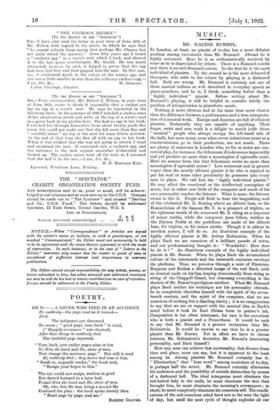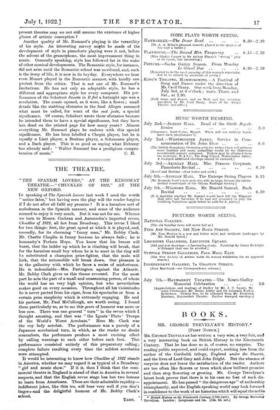MUSIC.
MR. WALTER RUMMEL.
IN London, at least, no pianist of to-day has a more debated position among executants than Mr. Rummel. Abroad he is highly esteemed. Here he is as enthusiastically received by some as he is depreciated by others. There is a Rummel coterie and there is an anti-Rummel coterie. To the first he is the most individual of pianists. To the second he is the most debased of thumpers, who adds to his crimes by playing in a darkened hall. Both are wrong. Mr. Rummel is certainly not one of those musical ruffians so well described in everyday speech as piano-punchers, and he is, I think, something better than a " highly individual " pianist. Before writing about Mr. Rummel's playing, it will be helpful to consider briefly the problem of interpretation in pianoforte music.
Nothing is more obvious and at the same time more elusive than the difference between a performance and a true interpreta- tion of a musical work. Europe and America are full of efficient pianists. Technically they are capable of anything. Their finger, wrist and arm work is a delight to watch (vide those " musical " people who always occupy the left-hand side of the hall), but mere notes, even when seven industrious years at a conservatorium go to their production, are not music. There are plenty of amateurs in London who, so far as notes are con- cerned play, for instance, the Schumann Kinderecenen impeccably and yet prodube no more than a meaningless if agreeable noise. Must we assume from this that Schumann wrote no more than meaningless if agreeable noises ? Less numerous and in greater vogue than the merely efficient pianist is he who is reputed to put his soul or some other peculiarity he possesses into every note he plays. We call him the " highly individual pianist." He may affect the emotional or the intellectual conception of music, but in either case little of the composer and much of his own personality reaches the listener. What is more, the listener seems to like it. People will flock to hear the languishing soul of the celebrated Mr. X. floating above an Alberti bass, or the Romanticism of the famous Mr. Y. in a prospect of triplets, or the righteous wrath of the renowned Mr. Z. rising on a sequence of minor ninths, while the composer, poor fellow, writhes in the Elysian Fields at the perfidious use made of his Alberti bass, his triplets, or his minor ninths. Though it is odious to mention names, I will do so. An illustrious example of the highly efficient pianist is Mr. Arthur Rubinstein. When he plays Bach we are conscious of a brilliant parade of notes, and our predominating thought is : " Wonderful ! How does he do it ? " An illustrious example of the highly individual pianist is Mr. Busoni. When he playa Bach the accumulated culture of the nineteenth and the twentieth centuries envelops the platform. True, we perceive through a mist of Einsteins, Bergsons and Rodins a distorted image of the real Bach, with an ironical smile on his lips, leaping demoniacally from string to string of the Chappell Grand, but °hamming everything is the shadow of Mr. Busoni's prodigious intellect. When Mr. Rummel plays Bach neither his technique nor his personality obtrude, he so completely identifies himself with the spirit of the seven- teenth century, and the spirit of the composer, that we are conscious of nothing but a dazzling clarity ; it is no exaggeration to say that we are en rapport with the musical idea in Bach's mind before it took its final lifeless form in printer's ink. Composition is too often interment, for rare is the executant who is both a pianist and a Prometheus. It would be rash to say that Mr. Rummel is a greater technician than Mr. Rubinstein. It would be unwise to say that he is a greater pianist than Mr. Busoni. Yet in effect we have to choose between Mr. Rubinstein's dexterity, Mr. Busoni's interesting personality, and Bach himself I How any man can achieve this universality, this divorce from time and place, none can say, but it is apparent to the least among us. Among pianists Mr. Rummel certainly has it. " Elimination," that " boss word " among musicians of to-day, is perhaps half the secret. Mr. Rummel certainly eliminates his audiences and the possibility of outside distraction by means of a darkened hall. The ideal interpreter must eliminate the red-haired lady in the stalls, he must eliminate the taxi that brought him, he must eliminate the morning's newspapers ; in short; he must completely eliminate his conscious self. The ramifi- cations of the sub-conscious mind have not so far seen the light of day, but until the next cycle of thought explodes all our
present theories may we not still assume the existence of higher planes of artistic conception ?
Another quality of Mr. Rummel's playing is the versatility of his style. An interesting survey might be made of the development of style in pianoforte playing were it not, before the advent of the gramophone, the most impermanent thing in music. Generally speaking, style has followed far in the wake of other musical developments. The Romantic style, for instance, did not arise until the Romantic school was moribund, and, such is the irony of life, it is now in its heyday. Everywhere we hear even Mozart played in the Romantic manner, with hardly one protest from the critics. That is not one of Mr. Rummel's limitations. He has not only an adaptable style, he has a different and appropriate style for every composer. His per- formance of the Schubert Sonata in B flat a fortnight ago was a revelation. The music opened, as it were, like a flower ; small details like the stabbing sforzatos in the final Allegro assumed what must be called, for want of the mot juste, a special significance. Of course, Schubert wrote those sforzatos because he intended them to have a special significance, but they have lain dead on the printed page for how many years ? Almost everything Mr. Rummel plays he endows with this special significance. He has been labelled a Chopin player, but he is equally a Liszt player, a Brahms player, a Schumann player, and a Bach player. This is as good as saying what Debussy has already said : Walter Rummel has a prodigious compre-











































 Previous page
Previous page